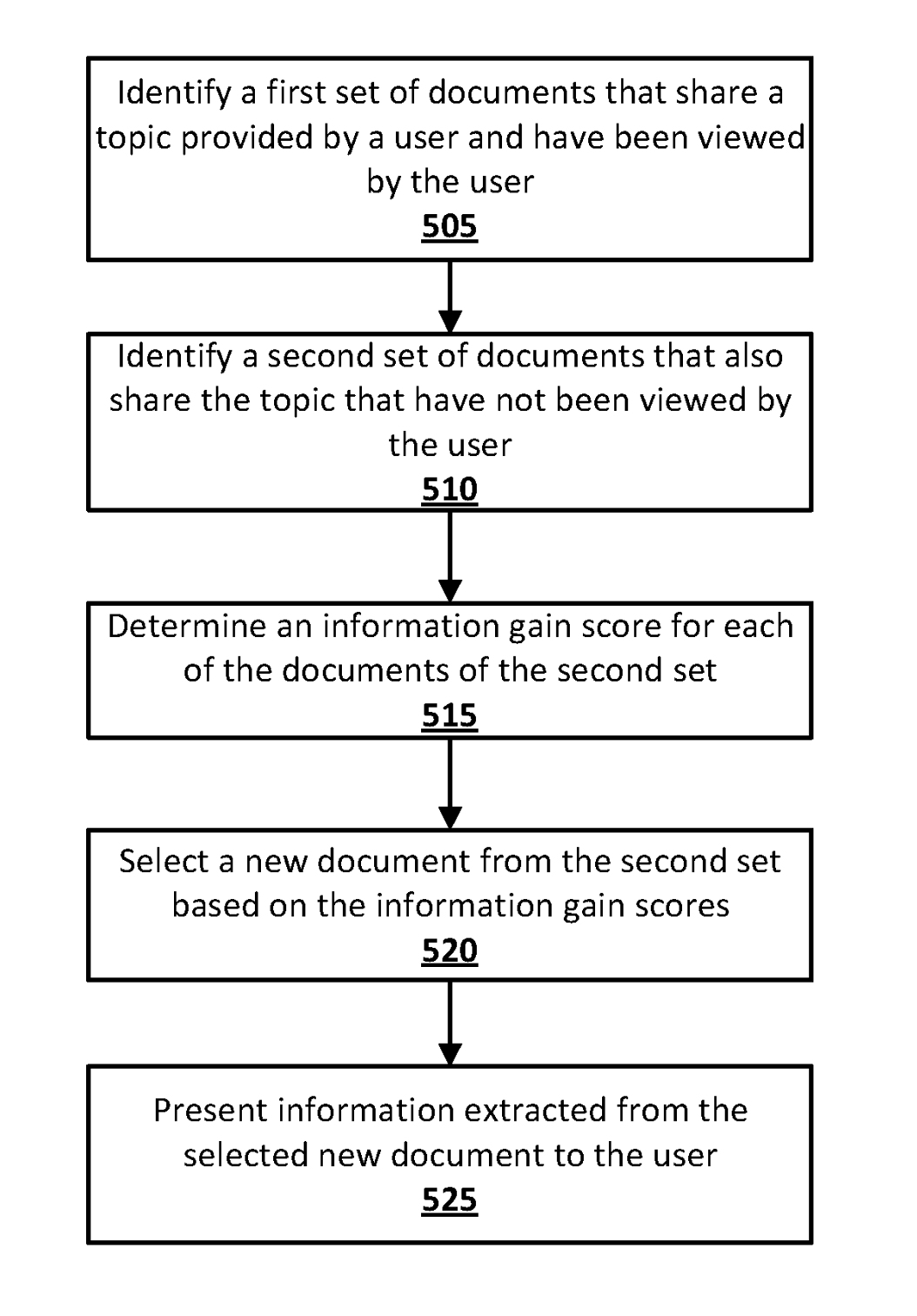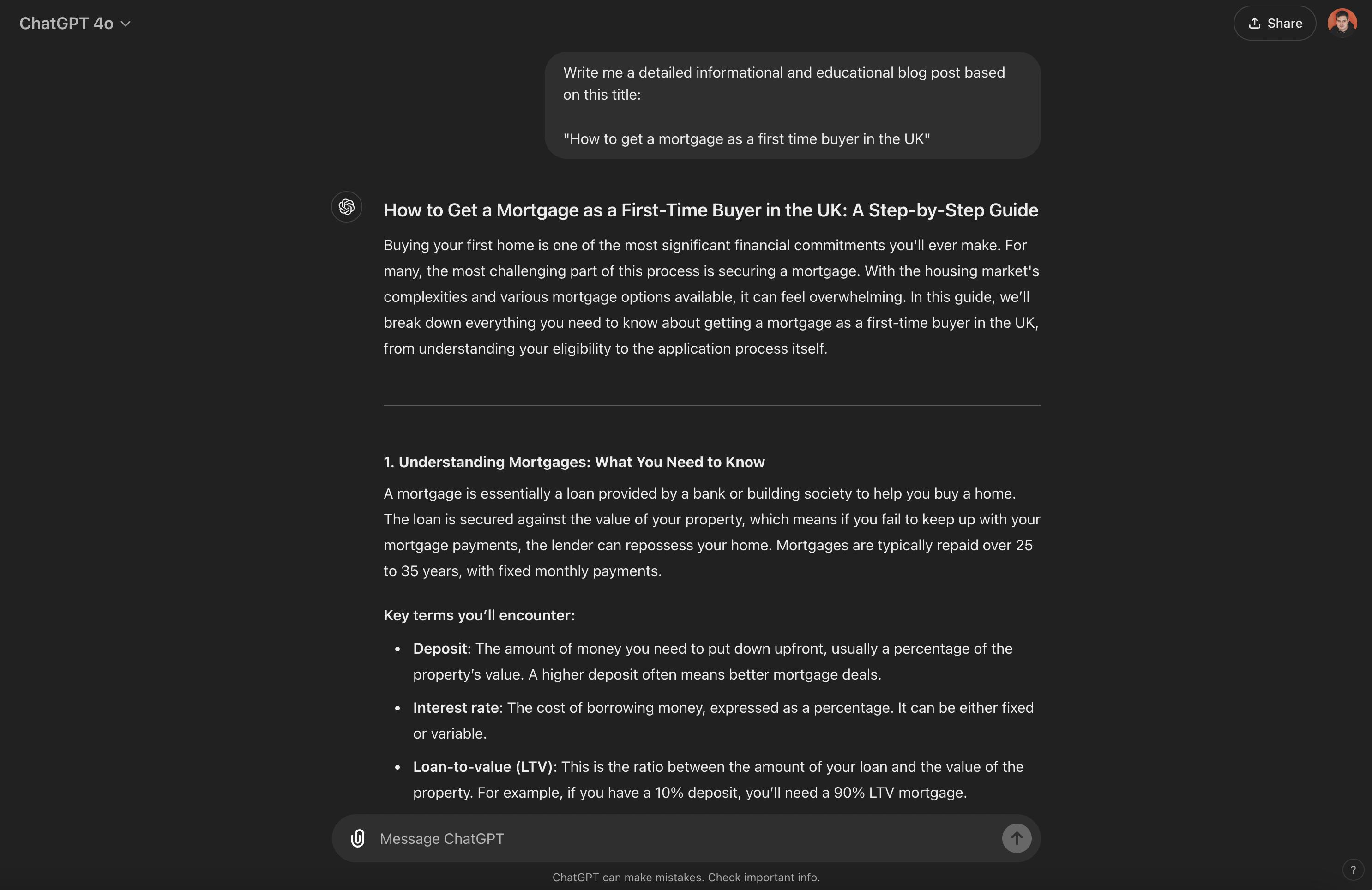
Information gain in SEO is a bigger deal than you probably think.
Copycat content is a massive problem for SEOs right now, and understanding how to leverage information gain can give you a competitive edge and help you to rank at the top of the SERPs amongst a sea of pages that offer nothing new.
For years now, SEOs have let themselves believe (I’ve been guilty of this at times in the past, we all have) that the best route to creating content that ranks is to take the skyscraper approach; to take what’s already ranking and make it a bit better. Often, that means creating what we could call Frankenstein content… taking best bits of the top few ranking pages and using them to create something ‘new.’
And that’s where the problem begins.
Doing this doesn’t actually create something new. It just mashes up content (including ideas and topics) from pages that already rank in the hope that Google sees them as some kind of ‘super’ page.
And for a while, this worked. If it didn’t, the approach wouldn’t have become so widely used.
But times have changed, and if this is still your approach, you’re going to want to switch things up as soon as you can. As tough as it is to hear, no one wants to read another piece of content that’s nothing more than a reworded version of the one they read a few minutes before. And in turn, this also means Google doesn’t want to rank it.
It’s time to level up your approach to content creation and start producing content that your audience actually wants to read and that actually deserves to rank.
And in this guide, I’m not just going to explain exactly what information gain in SEO is, but help you to understand why it’s such an important tactic to be using when creating or optimising content, as well as walking you through how to go about actually leverage information gain to win on the SERPs.
Things might get a little bit nerdy at times, but I’ll offer simple explanations too, where necessary.
Keep reading to learn why information gain is something that goes hand-in-hand with E-E-A-T and with “creating helpful, reliable, people-first content” and why it might just prompt the most important shift you make in your SEO strategy for years.
Information Gain: More than Just Another SEO Buzzword
You could be forgiven for thinking that information gain is just another SEO buzzword given how it seems everyone is all of a sudden talking about it.
But it’s not. It’s something you need to understand and use as a fundamental part of content creation.
And, for once, it’s a concept that has come straight from Google, rather than being a phrase coined by SEOs. In fact, it’s taken straight from a patent that was filed by Google in 2018 and published in 2020; “Contextual estimation of link information gain.”
But before I take a look at what this patent tells us, let’s look at what information gain means for SEOs in a more general and tactical sense.
What is Information Gain in SEO?
Information gain is all about how unique your content is in comparison to other content that’s already out there.
More specifically, we can think about it as a way to reward content that adds new information to any particular topic, rather than just curating other content information that already ranks.
It’s content that’s more valuable to searchers because it offers something that other, existing content doesn’t.
And it’s deeply rooted in the basis that Google wants to return content that’s useful to the searcher and provide a varied set of results; not just the same information presented in 10 or more different ways.
But just to clarify; it’s absolutely not about just creating longer content. Far from it. More words doesn’t mean more (or new) information.
Information gain in SEO is all about:
- How Google can overcome the challenge of similar/copycat/mass-produced AI content.
- How unique a piece of content is compared to everything else out there on that topic.
- The level of information you’d gain from a piece of content in comparison to other pages on the same topic.
- The information on a page that would be left if you removed all of the ‘consensus content’ (more on this soon)
- The value added to content that comes from experience and expertise. In other words, it’s not something that could be replicated by an LLM. This is key, and I’ll touch on this further shortly.
To fully understand what information gain means as an SEO, we need to look at some of the wording Google’s used around, in particular, the Helpful Content System.
Understanding ‘Content That’s Created to Gain Search Engine Rankings’ & ‘Consensus Content’
We’ve seen Google talk again and again about the need to publish content that’s ‘helpful,’ and how “Google’s automated ranking systems are designed to present helpful, reliable information that’s primarily created to benefit people, not to gain search engine rankings, in the top Search results.”
And something we need to pay close attention to here is the reference to rewarding content that’s primarily created to benefit people, not to gain search engine rankings.
It’s a line that’s been used by Danny Sullivan, John Mueller and many more Googlers when responding to questions from sites whose rankings and traffic were wiped out by the HCU, and one that has frustrated a good number of SEOs and site owners at times due to the ambiguity around it.
And, it’s a claim that’s often misunderstood, in my opinion, but one which we need to pick apart in order to understand why information gain is such an important part of SEO right now.
Google has given insight into what is meant by “search engine-first content,” sharing the following warning signs that the content approach being followed needs to be reevaluated.
I’m going to bold the points here that I believe we need to consider carefully when talking about information gain.
- Is the content primarily made to attract visits from search engines?
- Are you producing lots of content on many different topics in hopes that some of it might perform well in search results?
- Are you using extensive automation to produce content on many topics?
- Are you mainly summarizing what others have to say without adding much value?
- Are you writing about things simply because they seem trending and not because you’d write about them otherwise for your existing audience?
- Does your content leave readers feeling like they need to search again to get better information from other sources?
- Are you writing to a particular word count because you’ve heard or read that Google has a preferred word count? (No, we don’t.)
- Did you decide to enter some niche topic area without any real expertise, but instead mainly because you thought you’d get search traffic?
- Does your content promise to answer a question that actually has no answer, such as suggesting there’s a release date for a product, movie, or TV show when one isn’t confirmed?
- Are you changing the date of pages to make them seem fresh when the content has not substantially changed?
- Are you adding a lot of new content or removing a lot of older content primarily because you believe it will help your search rankings overall by somehow making your site seem “fresh?” (No, it won’t)
There’s more to creating helpful content than information gain. Of course there is. But one of the reasons why it’s becoming such a fundamental concept to SEO success is because it forms a key part of it.
If a page adds nothing new or unique to a topic when compared to other content that’s out there, can it really be considered as helpful? It’s doubtful.
And this leads nicely onto the concept of ‘consensus content.’
Consensus Content
This is another concept that’s come from Google, yet one that in many ways seems to oppose the idea of information gain. But that’s not quite the case, at least not when they’re considered together and how Google likely uses them as part of its ranking systems.
I’m going to look at this before we dive deep into Google’s information gain score, largely because of my belief that consensus content is what you need to consider as a topic’s baseline information, before you work to improve a page’s information gain.
Knowing how to use both consensus and information gain is going to be a key part of SEO success going forwards, as far as I’m concerned.
But what do we mean by ‘consensus content’?
It’s all about making sure your content aligns with the general consensus on a topic. This means your content needs to:
- Be properly researched
- Be factually correct
- Supported by evidence
- Align with information that’s widely accepted and verifiable by trusted sources
David Denton writes on the topic of consensus, stating that, “In the context of Google’s search algorithms, consensus refers to the trustworthiness and factual accuracy of a site’s content. High-quality content that reflects the consensus on a topic is more likely to be considered authoritative and reliable by both users and search engines.”
In simple terms, you can’t go telling your audience that bananas are blue. They’re not. They’re yellow. The widely accepted consensus is that they’re yellow. Imagine the uproar if someone searched Google for ‘bananas’ and was met with the top result telling them that bananas are a blue fruit. Consensus content reflects the truth that users expect to find, reinforcing both the trust and reliability of the page and publisher.
This doesn’t mean directly copying content that’s already out there, though. It’s about the finer topics and information within a piece of content and making sure that what you say matches the consensus.
Consensus comes from multiple high quality sources, not just any old sites. It’s about trusted consensus, with this post explaining more about what Google determines a high quality site.
We also see Google’s Quality Rater Guidelines state that, “for informational pages and pages on
YMYL topics, accuracy and consistency with well established expert consensus is important,” when talking about content quality.
Information Gain + Consensus
If consensus is about aligning with the widely accepted facts on a topic and information gain is about adding new, extra value content that goes beyond what others say, doesn’t that mean these two ideas conflict?
No, it doesn’t, despite initially appearing that way.
You see consensus should be thought about as being the baseline for your content to be considered eligible to rank. If you’re not aligning with the factually correct things in a topic, why would Google rank your content? It wouldn’t.
But that’s not enough. Many sites’ content will align with consensus, and information gain is the value and information that’s added beyond this.
Think about consensus as this baseline requirement and information gain as your competitive advantage and it starts to make a little more sense.
These aren’t competing concepts at all, they’re both part of any successful content strategy and must be used together. Overlook one, and you’ll struggle to rank.
Understanding Google’s Information Gain Score Patent
Now we’ve cleared up what information gain means in the tactical sense of SEO and content marketing, let’s dive a little deeper into understanding Google’s ‘information gain score,’ the key concept discussed in the search engine’s “Contextual estimation of link information gain” patent.
Filed in 2018 and published in 2022, this patent demonstrates methods of calculating an ‘information gain score’ for documents (in this context, web pages), then using this score to rank them.
In simple terms, the patent describes using information gain scores to rank web pages as search results. And based on what we’ve already learned about information gain, it’s perhaps no surprise to read that, “An information gain score for a given document is indicative of additional information that is included in the document beyond information contained in documents that were previously viewed by the user.”
When SEOs talk about information gain, what they’re really talking about is Google’s information gain score.
Here’s how information gain score calculation works:

The patent gives us a wealth of information into why the information gain score exists, and how it works. Here’s a top-line summary of the things you need to know:
- When multiple pieces of content exist on the same topic, it is expected that many of these contain the same information. This is consensus.
- After a searcher has viewed one of these pieces of content, viewing a second (or third etc.) is of less interest if the information that’s contained is the same. There’s less value in it because they’ve already had that value from the first piece.
- An information gain score can be calculated to determine the additional information that’s contained on a page of content beyond the others they’ve seen (or, in other words, beyond the general consensus). This isn’t meaning content that goes agains consensus, but information that goes beyond general consensus and is considered unique or value-adding.
- This information gain score is indicative of the information included that is was not included in others. An example that’s given in the patent is, “an information gain score for a document that includes information related to general computer repair, which may include software troubleshooting information, may be less indicative of information gain if the user has already previously viewed a document that includes information about common software application repairs.”
- A simple way to think about information gain is to ask yourself “what new information would I learn or take away from this piece of content compared to other pieces I’ve read?”
- Web pages, in this case, on the SERPs, can be ranked, at least in part, based on their information gain scores. They can also be excluded (or significantly demoted) from the search results based on these. The scores can be calculated based on the output of a machine learning model. Given Google’s increase use of machine learning in its algorithm in recent years, this should come as no surprise.
Perhaps the best summary of Google’s information gain score was written by Bill Slawski, who wrote that, “this may mean that boosting some pages in rankings based on how much information they would add to a searcher and demoting them if they don’t add much information to a searcher.”
I recommend reading Bill’s article to learn more about the patent and how information gain scores are calculated.
As an SEO or content marketer, that’s the main thing you need to know. Content that adds new or additional information to a topic will be rewarded on the SERPs, whilst content that offers less than what’s already out there will perform worse.
Of course, high quality content (I think we can safely refer to both consensus and information gain as parts of this) isn’t the only ranking factor that Google uses, hence why it’s not quite as simple as information gain guaranteeing better rankings. But all else being equal, a page that offers additional or new information on a topic can be expected to rank higher.
Information Gain Should Be a Massive Priority for SEOs Right Now
Creating content that ranks at the top of the SERPs shouldn’t be easy.
Let that sink in.
Creating top-performance content should involve a lot more than reworking what already exists and that ranks on Google. After all, if every piece of content out there is just a copycat version of the others, where’s the value to the reader?
Where’s the incentive for a user to browse through more than one result?
It’s simple. There isn’t. And that’s the whole point with information gain.
If Google’s top ranked results all say the same thing, that might as well be summarised and returned in an AI Overview.
Surely?
Improving information gain should be one of the biggest priorities for SEOs and content marketers right now, and here’s why:
- Information gain scores allow Google to understand and calculate how unique your content is compared to other pieces out there on the same topic. And, based on this, reward content that offers additional information. Reworking what ranks at the top of the SERPs might once have worked, but not anymore.
- It could well be the case that information gain scores formed a part of the Helpful Content System, given Google’s focus on this updated rewarding helpful, reliable and people-first content. Could information gain scores be one of the ways in which the algorithm rewards this? It would make sense, although we don’t have confirmation of this. Given that many of the sites who suffered in these updates were ‘niche sites’ that offered very little new or expert insights, it would definitely seem like this.
- Information gain scores could be an algorithmic way to identify ‘experience and expertise,’ both of which are part of E-E-A-T. After all, you’d expect that someone who has first-hand experience and/or formal expertise would be creating content that’s not just a regurgitation of everything else out there.
- It shouldn’t just be about SEO and rankings. Creating content that adds a new take, opinions or insights to a topic is better for your users and is likely to result in better engagement. Nobody wants to read another skyscraper post, trust me.
AI Overviews and Google’s Helpful Content System aren’t going anywhere, neither is the ease of being able to create consensus content on pretty much any topic in minutes with an LLM.
This means that information gain is now your fast-tracked route to outranking your competitors. Many SEOs are still to make the shift to prioritising information gain as part of their content creation and optimisation process, leaving an opportunity for those that do.
So then, how do you go about actually creating content that offers information gain?
How To Leverage Information Gain for Better Rankings on the SERPs
If you want to create content that performs on the SERPs, you need to not only understand what information gain is, but adapt your content production and optimisation processes to include it.
Here’s how…
1. Use subject matter experts as part of your content creation process
Subject matter experts within your business are a goldmine when it comes to information that can create information gain, and using them should form part of your process.
That doesn’t mean they need to create the content, though.
Subject matter experts can be used to:
- Review the content that currently ranks on the SERPs and identify things that are missing from it
- Help to create content briefs that include the key points to discuss (from the opinion of someone who knows the subject inside out, not from reviewing competitor content)
- Offer quotes and comments for inclusion within the content
- Provide suggestions for sources of information you may not otherwise find
- Proof and review content and make suggestions for additional things to include. This covers optimising existing content, too.
- Provide insight into hot topics and the things people need to know in the industry right now.
Using experts is often the difference between producing consensus content and content that contains information gain. Why? Because those ‘extra bits of information’ that make up information gain are the things inside a subject matter expert’s head; if it’s widely available information, that’s consensus content.
If your business doesn’t have subject matter experts? Find one and collaborate with them.
2. Use original research and/or first-party data within your content
One guaranteed way to create information gain is by using something that no one else has; original research and/or first-party data.
If you’re able to undertake your own research, you’re instantly including something that adds value when working this into your content. Yes, it takes time and resources to conduct your own research, but no one ever said content creation should be easy.
Go the extra mile to create something of value.
Many businesses also have their own data that can be used to add value to content. Stats from their own customers, for example.
Ask yourself what data you collect and how this could be used to add something extra to your content. In many cases, you’ll find lots of ways this can help you to do stand out.
3. Work with teams outside of marketing to understand the challenges and problems your customers or clients face
It’s easy to attempt to produce content within a marketing team. It’s usually quicker and requires less explanation on what you’re trying to do than working with other teams.
But this is the easy route. And remember what we said about content creation not being easy?
Work with other teams and you’ll instantly find yourself going beyond creating consensus content.
Sit down with other teams and use them to help you really understand the challenges and problems of your clients and customers.
Ask teams such as customer service and sales things like:
- What are the most common objections prospects have to our product or service?
- What do you get asked most often on sales calls?
- What are our most frequent customer service requests?
- Why do people choose us over our competitors?
Understanding your customers in extreme detail means you’re able to tailor content to these people. And this isn’t something you can do by looking at existing content on the SERPs.
Using LLMs / AI as Your Secret Weapon to Combat Copycat Content (No, Not as Your Writer)
I want to show you a smart way to use LLMs and AI such as ChatGPT, Claude or Google Gemini to help you to improve your content’s information gain.
And it’s based on the simple fact that LLMs output answers and responses based on consensus.
In other words, they can’t add anything new to a topic beyond what’s already out there. They’re useless at information gain.
So use this to your advantage.
Ask your chosen LLM to write a piece of content with the same intent and topic as what you’re trying to rank and use that as a perfect example of what consensus-led content looks like.

Compare this to your own, and ask yourself what you’ve added that the consensus content from the LLM doesn’t include.
This is information gain. It’s the opinions, insights, quotes and more than an LLM could never come up with because they’re the things unique to your business.
If you removed the content from your piece that matched what was output from the LLM, then the content that improves your information gain score is what’s left.
LLMs are great for producing consensus content, so leverage them for this, rather than as a writer. If you want a quick and easy way to ensure you’re producing content that goes beyond consensus and includes some level of information gain, then AI is your best friend.
Using AI in SEO is all about figuring how you can use it as part of your workflow to make certain tasks easier (or even possible), and this is one of them where it’s a perfect fit.
Information Gain; One of the New Foundations of SEO Success
SEO has changed in the last few years, and one of the biggest changes is information gain.
In fact, I’d go so far as to say it’s one of the new foundations of SEO success.
If you want to rank at the top of the SERPs in 2024 and beyond, you need to understand that a technically strong site that can be crawled and indexed is a must, as is meeting ‘SEO best practices.’
But beyond that?
Intent + Information Gain + Reputation = SEO Success
Don’t overlook the importance of information gain in SEO. It’s one of the biggest opportunities you have to own the SERPs.



